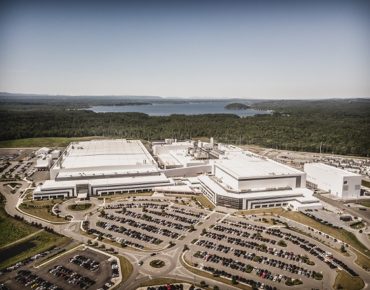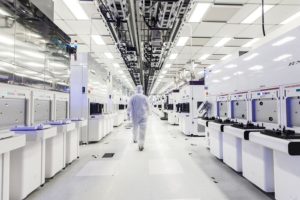GlobalFoundries to Spend $1B to Expand Chip Capacity; Unveils Plans for New Fab Plant

Chipmaker GlobalFoundries is planning to spend $1 billion to add needed chip manufacturing capacity as soon as possible at its fab plant in Malta, N.Y., while also unveiling its intentions to add an all-new fab plant that will double its overall chip production.
The announcements came July 19 (Monday) in a ceremony at the company’s chip plant which was attended by U.S. Sen. Majority Leader Charles Schumer, U.S. Secretary of Commerce Gina M. Raimondo and others who gathered for a discussion about solving U.S. semiconductor supply chain shortages.
The $1 billion investment by GlobalFoundries into its existing Fab 8 facility will start immediately to help address the chip shortages, according to the company, while the planning and construction of an all-new fab facility will follow as public and private partnership negotiations and funding options are pursued.
The $1 billion Fab 8 expansion investment, which will occur within the existing facility’s footprint, will add an additional 150,000 wafers per year to the company’s present production capabilities within its existing fab.
And though CEO Tom Caulfield said he was excited about the company’s plans to add the all-new fab facility to double its overall capacity, few details were unveiled at the event. The photo above is of the company's existing Malta plant layout.
Caulfield did share that the new fab plant, when it is completed, will add 1,000 high-tech jobs and thousands of indirect jobs such as construction jobs for the region in upstate New York.
The new facility is not close to being started, however. For it to happen, there needs to be plans and discussions of private-public partnerships with funding coming from customers, federal and state agencies and more, according to the company. “This new capacity will serve the growing demand for secure, feature-rich chips needed by high-growth markets including automotive, 5G connectivity and the internet of things,” GlobalFoundries said in a statement. The facility will also support national security requirements for a secure supply chain.
"Our industry is expected to grow more in the next decade than it did in the past 50 years and GF is stepping up to do its part as we work together to address the growing demand for technology innovation for the betterment of humanity,” said Caulfield.
In a reply to an emailed inquiry from EnterpriseAI, the company said that it is not ready to confirm a timeline for the new facility, but that it will follow its Fab 8 expansion project. “Our investments within the existing factory will start to yield chips in early 2023,” the statement said.
The coming investments are part of the company's broader global expansion plans that include the recently announced new fab in Singapore and $1 billion planned investment to expand in Germany, which are being done to meet the growing demand from customers worldwide, the statement added.
GlobalFoundries employs more than 15,000 people worldwide, including 7,000 people across the U.S., and nearly 3,000 at its headquarters in Malta, New York. The company has invested more than $15 billion in its Fab 8 facility over the last decade to support innovation and increase manufacturing capacity.
In April, the company also announced that it is moving its corporate headquarters to Malta, where it has its most avanced semiconductor manufacturing facilities.
The company would not reveal which chips it plans to build in the coming new fab facility and would only say that the chips will be designed for high-growth markets including automotive, communications, data center and mobile device markets for its global customers. The chips built in Malta will also serve one of the company’s most important customers – the U.S. Department of Defense – where the chips are used to serve critical national security needs, according to GlobalFoundries.
Bob O’Donnell, principal analyst for TECHnalysis Research, attended the company’s announcement event and told EnterpriseAI that the news about the new fab is huge.
“The timing they intentionally left a little vague because to be honest with you I think they are waiting to see how much government support they get,” said O’Donnell. “That's my guess. There are a lot of governmental actions [to fund chip production recently] and there are going to be big chunks of money opened for exactly these kinds of projects. I think they wanted to make the splash that they are going to do it, and then the details will get filled in over time.”
GlobalFoundries made it clear when they built the existing Fab 8 facility some 10 years ago that it was overbuilt to include future capacity for expansion, he said. So, the first thing they will do, which is relatively easy, is to spend the $1 billion that was announced so it can add the additional equipment needed to ramp up production using the space that is already there, said O’Donnell.
“That is number one, and that is going to happen relatively soon,” he said. The actual construction of the new fab will take at least several years, he added, which will also include time to build in the needed infrastructure, for power, water and other needed utilities. “They are massive factories that require a huge amount of infrastructure,” said O’Donnell. “Some of that infrastructure takes a long time.”
And even though the company is not giving out many details about the fab that will arrive later, O’Donnell said it is a safe bet to figure that it will not build chips smaller than 12nm.
“GlobalFoundries has staked a name for itself by not doing leading-edge node [sizes], so they do not do anything smaller than 12nm as part of a philosophical decision about three years ago, and it caused quite a bit of controversy at the time,” he said. “But in retrospect, it makes perfect sense because chasing the latest [smaller] nanometer nodes is a ridiculously expensive business. And it was not something they felt like they could win at. They felt there was plenty of opportunity to do older [larger] nodes, but with other types of technologies, and it has proven to be quite smart as a business strategy.”
There is a huge market for chips that are of larger sizes, said O’Donnell. “They tend to not be quite as sexy and they are not as expensive individually, but collectively they generate a huge amount of money. Ninety percent of the chips in a car can be built by GlobalFoundries, and there are 10 percent that they cannot build. They are not trying to do that. They can build the other 90 percent.”
Another analyst, Karl Freund, founder and principal analyst with Cambrian AI Research, said the announcements are good news for the global semiconductor supply chain.
It could be even better news, said Freund, if a report by The Wall Street Journal on July 15 comes to fruition. The Journal story said Intel is pursuing a potential $30 billion offer to buy GlobalFoundries and boost its chipmaking even more, based on interviews with people who are familiar with the matter.
“It could be good for Intel as well if that [rumored] deal progresses,” said Freund. “We need more U.S.-based fabs, and I have to wonder if GlobalFoundries and Intel [if that acquisition might take place] would not be better off planning this one to be an advanced process-node facility.”
GlobalFoundries’ CEO Caulfield strongly denied the rumors of an acquisition by Intel during an interview about the fab news on July 19 with CNBC business reporter, Jon Fortt.
“There’s nothing to that story,” Caulfield told Fortt in the interview.
Fortt also asked Caulfield about whether he has concerns about building more chip fab plants due to previous industry boom and bust patterns over the years.
“The reason why I have confidence that we're not going to have this burst of capacity and create some of the old cyclicality of the industry – it's very simple,” said Caulfield. “This industry has to double in the next few years.”














